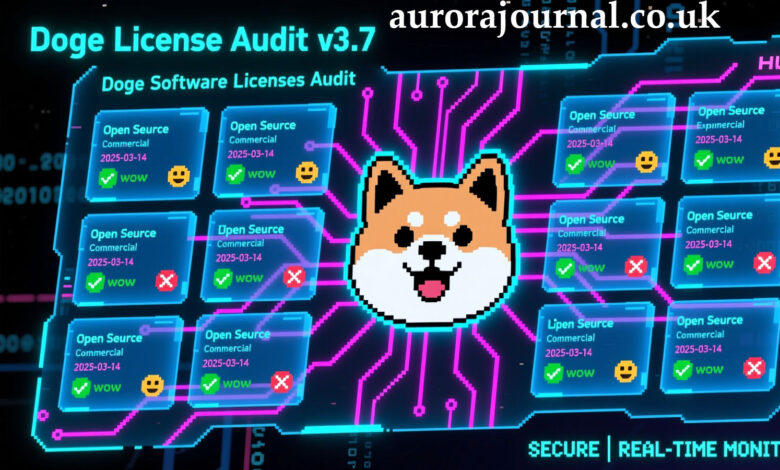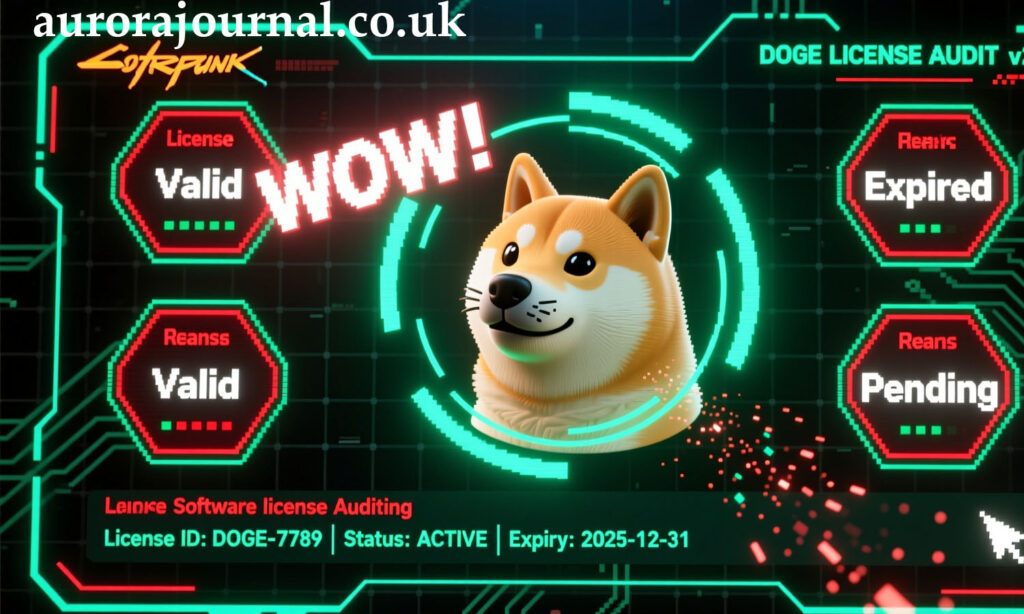Doge Software Licenses Audit HUD: A Complete Guide to Compliance, Security, and Optimization

In today’s fast-paced digital ecosystem, software audits are not just a necessity—they are a cornerstone of responsible IT management. Among the innovative tools emerging in this domain, the Doge Software Licenses Audit HUD stands out as a revolutionary solution that simplifies the process of monitoring, auditing, and ensuring compliance with software licensing requirements.
Whether you are an enterprise managing hundreds of software assets or a small business relying on a handful of digital tools, the Doge Software Licenses Audit HUD provides a centralized, intuitive dashboard that brings clarity and control to your licensing environment. This article delves into what the Doge Software Licenses Audit HUD is, how it works, its benefits, and why it has become a crucial tool in modern IT compliance strategies.
Understanding Doge Software Licenses Audit HUD
What Is It?
The Doge Software Licenses Audit HUD (Heads-Up Display) is a specialized monitoring and compliance interface that provides organizations with real-time visibility into their software licenses. The term “HUD” describes its dashboard-style interface, which clearly and interactively displays license status, usage trends, and compliance issues.
It integrates with multiple platforms and vendors to track licenses across operating systems, cloud services, and installed applications—making it a holistic tool for managing software governance.
People Read Also : Leslie Knipfing: The Quiet Force Behind the Scenes
Key Components
- License Inventory System – Keeps a detailed record of all installed and active software licenses.
- Compliance Tracker – Monitors adherence to vendor agreements and alerts administrators about potential violations.
- Usage Analytics – Tracks real-time software usage to detect underutilized or unused licenses.
- Security Integrator – Identifies unauthorized installations that could lead to legal or cybersecurity risks.
The Doge Software Licenses Audit HUD ensures no license goes unmonitored, which is especially crucial for companies scaling their IT operations rapidly.
Why Software License Auditing Matters

Software license audits are not simply about avoiding fines—they are about optimizing software investments and reducing vulnerabilities. Non-compliance can result in heavy penalties, reputational damage, and even data breaches.
The Doge Software Licenses Audit HUD provides preventive insights, enabling businesses to take action before an audit becomes a liability.
Key Reasons to Conduct Regular Audits
- Regulatory Compliance: aids in preserving adherence to software agreements and legal standards.
- Cost Efficiency: Prevents over-licensing and under-licensing, ensuring resources are optimally used.
- Security Assurance: Detects unauthorized or pirated software that may expose systems to threats.
- Strategic Planning: Enables better decision-making for renewals, upgrades, or vendor negotiations.
How the Doge Software Licenses Audit HUD Works
1. Integration and Data Collection
The HUD connects to various systems—cloud services, ERP tools, and local installations—to collect software data.
2. Data Normalization and Categorization
Collected data is standardized, identifying software titles, versions, and license terms.
3. Compliance Mapping

The HUD automatically matches licenses to their usage, highlighting discrepancies.
4. Visualization
Through the intuitive Doge HUD interface, administrators can view compliance status, risk levels, and optimization opportunities in real-time.
5. Reporting and Alerts
The system generates detailed reports and sends alerts whenever anomalies are detected, such as expired or duplicated licenses.
This automated flow not only saves time but also minimizes human error, one of the biggest risks in manual audits.
Benefits of Using Doge Software Licenses Audit HUD
1. Centralized Oversight
Organizations often juggle multiple vendors, each with unique license terms. All of them are combined into a single, easily accessible panel by the Doge HUD.
2. Automation of Compliance Tasks
Manual license management can be tedious. Doge Software Licenses Audit HUD automates discovery, tracking, and reporting—reducing administrative overhead.
3. Enhanced Security Posture
By identifying unauthorized software, the HUD protects against data leaks and malware risks often associated with unlicensed tools.
4. Data-Driven Decision Making
With real-time analytics, businesses can determine which licenses are overused or underused and adjust their software strategy accordingly.
5. Reduced Legal Risks
The system provides clear documentation and proof of compliance, ensuring companies are audit-ready at any time.
Real-World Applications of Doge Software Licenses Audit HUD

- Enterprise IT Departments
Large corporations use it to track global software deployments across multiple offices and teams. - Government Agencies
Public sector entities rely on audit systems like the Doge HUD for transparency and compliance with procurement rules. - SMBs and Startups
Smaller companies benefit from cost savings and improved visibility into their growing software stacks. - Educational Institutions
Universities use license auditing to ensure academic software is distributed legally among faculty and students.
Challenges Solved by Doge Software Licenses Audit HUD
- Over-licensing: Paying for unused software.
- Under-licensing: Facing compliance risks due to insufficient licenses.
- Vendor Complexity: Managing diverse licensing models (subscription, perpetual, seat-based, etc.).
- Data Fragmentation: Centralizing license data scattered across cloud and local systems.
- Audit Stress: Preparing automatically for vendor audits without last-minute panic.
The Doge HUD addresses all these with predictive analytics and automated compliance validation.
Conclusion
More than just a compliance tool, the Doge Software Licenses Audit HUD is a digital transformation enabler that helps companies remain safe, effective, and compliant with the law. By automating audits, visualizing data, and minimizing human error, it turns a once cumbersome process into a strategic advantage.
Frequently Asked Questions (FAQs)
1. What makes Doge Software Licenses Audit HUD different from other tools?
The Doge HUD is designed not just for tracking licenses but for providing actionable intelligence. Its visual interface, automation features, and multi-platform integrations make it stand out from traditional tools.
2. How often should companies run software license audits?
It’s best practice to run continuous monitoring using Doge Software Licenses Audit HUD, with full audits at least twice a year to ensure ongoing compliance.
3. Can the Doge Software Licenses Audit HUD integrate with cloud-based tools like AWS or Azure?
Yes. It integrates seamlessly with cloud environments, offering visibility across both on-premise and SaaS systems.
4. Is the Doge Software Licenses Audit HUD suitable for small businesses?
Absolutely. Its scalable design makes it suitable for startups and enterprises alike, allowing customization based on business size.
5. Does it help prevent data breaches?
Indirectly, yes. The HUD reduces attack vectors and improves cybersecurity hygiene by getting rid of illegal or pirated applications.
6. What kind of reports can it generate?
It can create compliance summaries, cost optimization reports, usage trend analyses, and audit-ready documentation.



